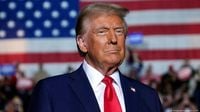On Sunday, May 4, 2025, President Donald Trump announced a sweeping 100% tariff on movies produced outside the United States, claiming that the American film industry is "dying a very fast death." In a post on Truth Social, Trump emphasized that this drastic measure is necessary due to the incentives other countries offer to attract American filmmakers. He stated, "This is a concerted effort by other Nations and, therefore, a National Security threat. It is, in addition to everything else, messaging and propaganda!" Trump made it clear that he wants to see more films made domestically, declaring, "WE WANT MOVIES MADE IN AMERICA, AGAIN!"
The President authorized the Department of Commerce and the United States Trade Representative to begin implementing the tariff immediately. Commerce Secretary Howard Lutnick responded to the announcement on X, stating, "We're on it." This bold move comes in the wake of China's recent decision to reduce the number of U.S. films it imports, further intensifying the competition between Hollywood and foreign film industries.
However, the practical implications of such a tariff remain murky. Many films are shot abroad not only for tax incentives but also to capture exotic locations that enhance storytelling. Questions arise about how the tariff would affect ongoing productions or those already completed. The uncertainty extends to whether the plan would also encompass television productions, and what retaliatory measures might ensue from other countries.
In a broader context, Trump's announcement touches on the ongoing tension between the U.S. and various countries regarding trade practices. His administration has previously engaged in tariff disputes, and this latest move could signal a new chapter in the ongoing trade war.
Meanwhile, Trump also hinted at a potential shakeup in his administration, indicating that Stephen Miller, his former deputy chief of staff, is a frontrunner to become the new national security adviser. This announcement follows Trump's decision to nominate Mike Waltz as the U.S. ambassador to the United Nations, a role he is expected to fill temporarily. Waltz has faced scrutiny over the "Signalgate" scandal, in which he took "full responsibility" for mistakenly adding a journalist to a group chat discussing military operations.
Trump expressed confidence in Miller's capabilities, stating, "I think he sort of indirectly already has that job. Because he has a lot to say about a lot of things. He's a very valued person in the administration." He anticipates filling the national security adviser position within the next six months.
In other developments, Trump announced plans to instruct the Federal Bureau of Prisons to "rebuild and open Alcatraz" to house the nation’s most dangerous criminals. The infamous prison, located on an island off the coast of San Francisco, was closed in 1963 due to high operating costs but remains a popular tourist attraction. Trump's proposal to reopen Alcatraz raises questions about the future of the prison's historical significance versus its potential as a correctional facility.
As these announcements unfold, the implications for both the film industry and U.S. foreign policy remain to be seen. Trump's administration continues to navigate complex issues that intertwine domestic interests with international relations.
In a related story, Vietnam's Prime Minister Pham Minh Chinh addressed the challenges his country faces due to potential U.S. tariffs that could reach 46% if negotiations do not yield results before a moratorium expires in July 2025. Speaking on May 5, 2025, Chinh expressed optimism about achieving at least 8% growth this year, despite the adverse effects of tariffs on Vietnam's export-driven economy.
Chinh noted that Vietnam is among the first nations to engage in tariff negotiations with the U.S., with the first session set for May 7, 2025. The Prime Minister emphasized that while challenges abound, the trade war could also provide opportunities for Vietnam to restructure its economy. The country recorded a substantial trade surplus with the U.S. last year, amounting to over $123 billion.
In a separate development, Yemen's Houthi rebels announced plans to impose a "comprehensive" aerial blockade on Israel in response to escalating military operations in Gaza. This declaration, made on May 4, 2025, highlights the ongoing tensions in the Middle East and the potential for further conflict.
As the global landscape shifts, the intertwining of trade policy, national security, and international relations continues to shape the narrative of contemporary governance. Trump's statements and actions reflect a broader strategy to prioritize American interests while navigating the complexities of global diplomacy.





